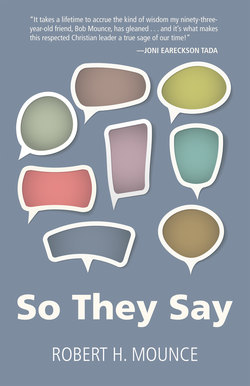Читать книгу So They Say - Robert H. Mounce - Страница 11
На сайте Литреса книга снята с продажи.
Don’t waste the irreplaceable
ОглавлениеDwight Eisenhower once noted, “Wise men do not lie down on the tracks of history waiting for the train of the future to run over them.” Vivid metaphor, and more true than we are normally willing to admit. It is self-evident that to each of us was given a certain amount of time and how it is used is strictly up to the individual. Time is the only irreplaceable element in life. An hour once used, for whatever purpose, is gone and cannot be regained.
How we use time is an expression of our priorities in life. For some, life is all about achieving our goals. For many the primary purpose in life seems to be the acquisition of stuff. Why else would we carve out a schedule in which ”time on the job” is the central concern? That orientation is widely acknowledged for the earlier years in a profession, after all, the house needs to be purchased, the kids need a good education, etc. All laudable concerns, but when is enough, enough? What seems to happen is that our desire for more morphs from an understandable concern to an addiction that controls he rest of life. This makes time simply something to be filled with doing, rather than an opportunity to enjoy the fruit of energy wisely spent.
For others, time is little else than an endless occasion to do whatever we want to do. This outlook is prevalent in a certain sector of society and has the same potential as above for abusing time. Little expected, nothing required. For most people, this would be a contradiction of all that it means to be alive and well in time. It is hard to convince the average person that life has no significant purpose and that God, if there be one, is unconcerned whether or not we squander time however we want to.
Somewhere between these extremes there ought to be the balance the yields the most productive and most satisfactory way to use the gift of time. But where is that balance, the fulcrum between work and play, earning and enjoying? Here is one possibility: Genesis shows how God apportioned his time during the one week in which he is said to have worked (speaking anthropomorphically) — he worked six days and took a day off (Gen 2:2-3). Not a bad idea. Good ratio. Work a solid day, relax, do something entirely different, in the evening. Work in your profession 40 years, and then retire. Mingle “work” and “recreation.”
Now there is an interesting word, “recreation;” it means to “create anew,” to “re-freshen.” So there is a definite purpose in not working a reasonable amount of time; it is to renew, refresh, recondition, reinvigorate. A period of renewal is a gift we give to ourselves. Jesus taught that “the Sabbath was made for man, not man for the Sabbath” (Mark 2:27). It is as true in the secular world as it is for the community of faith. Time off restores, revives.
So, do what God did. Balance your time in successive periods of work and relaxation. And do both intentionally with all the effort required.
